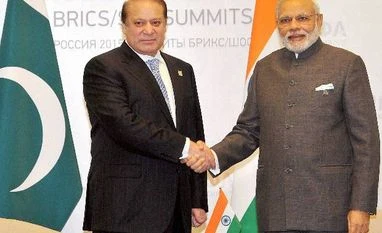“What is important is to spread confusion, not eliminate it”, said the Spanish painter, Salvador Dali. A look at the newspapers today morning could have convinced me that Dali was talking about India Pakistan relations. Pakistan’s High Commissioner to India Abdul Basit had announced yesterday that the peace process between India and Pakistan stood suspended. The Indian government was left red faced.
The newspapers left me confused because this represented a role reversal. It was not clear which side was suing for peace and which side had been involved in terror activities. If one went by today’s papers only, it would seem as if Pakistan had been a victim of a terror attack at one of its air bases by Indian terrorists. As we all know, Pathankot airbase is still in India and was a part of India in the first week of January too when terrorists from Pakistan attacked it.
This statement by the Pakistani High Commissioner followed a visit by a joint investigation team (JIT) from Pakistan that included officers from Pakistan’s Intelligence Bureau and the ISI. The Pakistan JIT was given a grand tour of India’s air base at Pathankot. Once in Pakistan, it was announced that India had failed to provide any evidence of a terror attack while Pakistani media carried source based reports about the JIT having called the Pathankot attack a false flag operation. Meanwhile, the Pakistani authorities shared video confession of Kulbhushan Jadhav who they claimed was a RAW agent working to destabilise Pakistan by fomenting separatism in Balochistan.
Read more from our special coverage on "NARENDRA MODI"
- PM Modis promise to double rural income leaves farmers, experts cold
- The poor deposit life savings in banks, while rich take loans and flee, says PM
- Modi govts Dalit, peasant and agrarian push over next three weeks
- BJP files complaint against journalist for morphed Modi photo
- Govt to focus on execution, go slow on new scheme launches
The Indian side hasn’t come out with a coherent response yet. India under Prime Minister Modi has sought to reshape India’s foreign policy, as is its remit. It has tried to reinvent some relationships -- like with China. It has tried to reinvigorate others -- like the one with US and it has tried to be ‘adventurous’ with Pakistan (for lack of a better word). While its first two endeavours have resulted in a lot of heat and light but little real matter, its attempts at courting Pakistan have left the wisest men befuddled.
From the shawl and saree diplomacy between the Indian and Pakistani Prime Ministers to cancellation of Secretary level talks over the question of Hurriyat Conference to loud noises about increasing casualties in cross firing at the border to dismissing the talk of NSA level meet before they actually met in a third country to the attack in Gurdaspur and then the Pathankot episode this year, to the carefully orchestrated charade of a spontaneous airdrop of the Indian PM to a wedding in Nawaz Sharif’s family in Lahore, the India-Pakistan relationship has seen more twists, turns and contradictions than a Saas-Bahu saga on TV.
Under Prime Minister Modi, Indian foreign policy has sought to build international partnerships on the base of personal relations that Mr. Modi shares with other heads of states. Nearly two years into his tenure, the strategy seems to be coming a cropper particularly in case of Pakistan. In these two years, India has allowed Pakistan to escape the blame for terror attacks that originate from within Pakistani borders. In these two years, the Pakistani side has sought to dismiss terror attacks in India as false flag operations. In these two years, Pakistan has taken the initiative in suspending the peace process.
By suspending the process, Pakistan has sent a clear message: India needs to talk to us; we don’t have any such need and if Pakistan agrees to do so, it will be on its own terms. Contrast this with the silly red-lining of this relationship by calling secretary level talks off in 2014 over the issue of Hurriyat Conference’s involvement. In these two years’ time, the Pakistani civil-military complex, past masters of dissembling, have managed to run circles around a confident looking Indian Prime Minister.
More From This Section
“Why, sometimes I've believed as many as six impossible things before breakfast”, said the Queen to Alice in Alice in Wonderland.
The Indian government was at pains to keep its energetic attempts at rapprochement with Pakistan alive in the aftermath of the Pathankot attack. It sought to portray the relationship as a different one from earlier occasions. The Modi government had bought the sincerity that the Nawaz government sought to convey and it wanted to sell this ‘sincerity’ as the reason for continuing the process started so energetically by Mr. Modi. It is not clear whether the PM and his government see things differently now. Perhaps they feel too invested in the current process to force any course correction now. Dear Sir, perhaps it isn’t wise to throw good political capital after bad to salvage it. Perhaps it is time to stop believing in impossible things.
As I wrote after the Pathankot attack, the Indian PM would do well to remember that his Prime Ministership is not permanent, while the Indian state probably is. Can the Indian state afford to pay the costs of pursuing this risky policy with Pakistan for another three years just because the Prime Minister feels invested in a personal bond with Nawaz Sharif?
In foreign policy, activity and energy cannot be substitutes for actions and national interests and even the strongest bouts of Statesmanitis cannot be allowed to harm national interests. India’s Pakistan policy under the Modi government, has unfortunately been a carousel roundabout, with a lot of apparent movement but going nowhere.
Twitter: @bhayankur
)